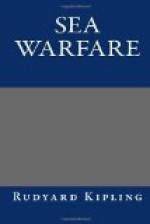And the following day was spent “resting in the centre of the Sea of Marmara.” That was their favourite preening perch between operations, because it gave them a chance to tidy the boat and bathe, and they were a cleanly people both in their methods and their persons. When they boarded a craft and found nothing of consequence they “parted with many expressions of good will,” and E11 “had a good wash.” She gives her reasons at length; for going in and out of Constantinople and the Straits is all in the day’s work, but going dirty, you understand, is serious. She had “of late noticed the atmosphere in the boat becoming very oppressive, the reason doubtless being that there was a quantity of dirty linen aboard, and also the scarcity of fresh water necessitated a limit being placed on the frequency of personal washing.” Hence the centre of the Sea of Marmara; all hands playing overside and as much laundry work as time and the Service allowed. One of the reasons, by the way, why we shall be good friends with the Turk again is that he has many of our ideas about decency.
In due time E11 went back to her base. She had discovered a way of using unspent torpedoes twice over, which surprised the enemy, and she had as nearly as possible been cut down by a ship which she thought was running away from her. Instead of which (she made the discovery at three thousand yards, both craft all out) the stranger steamed straight at her. “The enemy then witnessed a somewhat spectacular dive at full speed from the surface to 20 feet in as many seconds. He then really did turn tail and was seen no more.” Going through the Straits she observed an empty troopship at anchor, but reserved her torpedoes in the hope of picking up some battleships lower down. Not finding these in the Narrows, she nosed her way back and sank the trooper, “afterwards continuing journey down the Straits.” Off Kilid Bahr something happened; she got out of trim and had to be fully flooded before she could be brought to her required depth. It might have been whirlpools under water, or—other things. (They tell a story of a boat which once went mad in these very waters, and for no reason ascertainable from within plunged to depths that contractors do not allow for; rocketed up again like a swordfish, and would doubtless have so continued till she died, had not something she had fouled dropped off and let her recover her composure.)
An hour later: “Heard a noise similar to grounding. Knowing this to be impossible in the water in which the boat then was, I came up to 20 feet to investigate, and observed a large mine preceding the periscope at a distance of about 20 feet, which was apparently hung up by its moorings to the port hydroplane.” Hydroplanes are the fins at bow and stern which regulate a submarine’s diving. A mine weighs anything from hundredweights to half-tons. Sometimes it explodes if you merely think about it; at others you can batter it like an empty sardine-tin




